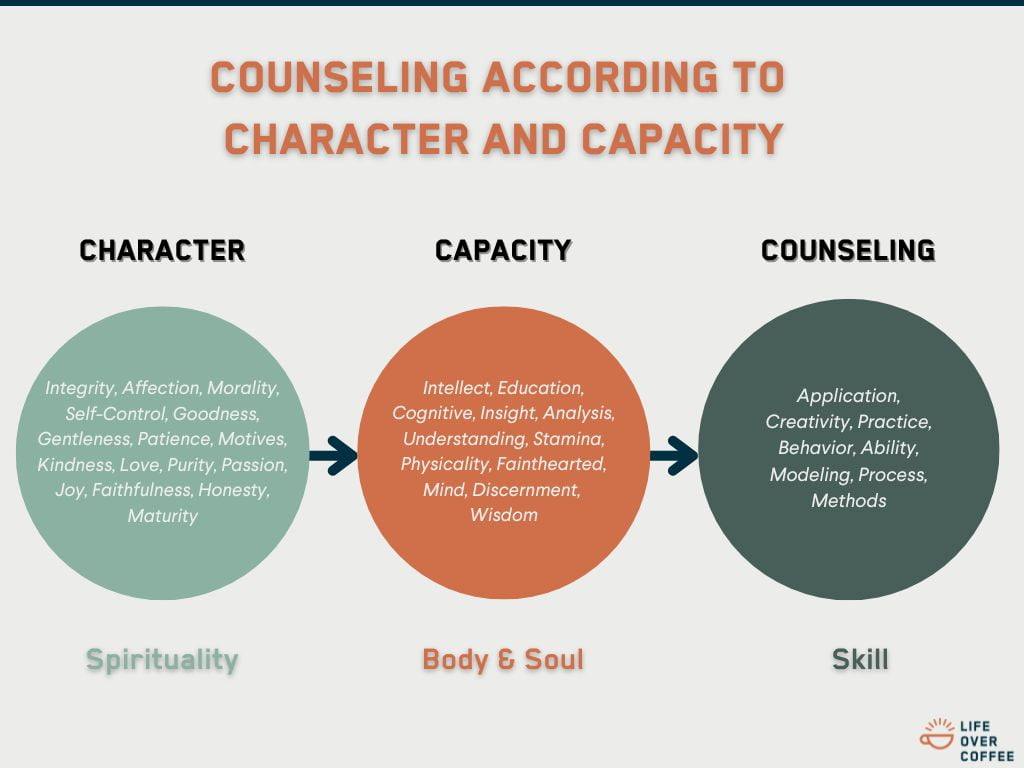Ep. 434 People with Different Character and Capacity Issues

Photo: ©StefaNikolic from Getty Images Signature via Canva.com
Shows Main Idea – Just curious if you might flesh out the differences between capacity versus character issues. I assume we would expect a response to God’s truth in whatever capacity someone could respond. I wonder what you think about a person unable to process truth because of diminished soul issues; thus, their behaviors reflect those compromised soul issues. It would help me understand this problem a bit better.
Show Notes
You may want to read:
What Is She Asking?
- She’s talking about the difference between soul and body issues or non-organic and organic problems. She’s calling soul problems character matters and organic problems behavioral.
- She wants to know about the interplay between body and soul, or capacity and character, regarding responding to God’s truth.
- For example, if a person is not changing, you must distinguish between their character and capacity to know if it’s possible or impossible for them to change.
Character and Capacity

Three Metaphors
- Fastball: Everyone has a different speed on their fastball, and at some point, they will not be able to throw faster. We all have God-imposed limitations.
- Highbar: Similar to the fastball analogy, we can only jump so high, and some folks can jump higher than others.
- Buckets: We all have a different size container, which implies discerning a person’s capability is vital if you want to help them.
Mastermind Training
One of the most vital things we do in our Mastermind Training course is to attempt to discern a student’s character and capacity. We do this to guard against mismatches: placing a future counselor in a counseling session when they are not qualified to help. Thus, they hurt the counselee.
Helpful Text
And we urge you, brothers, admonish the idle, encourage the fainthearted, help the weak, be patient with them all (1 Thessalonians 5:14).
- Admonish the Idle: The lazy person who won’t get off his rear end to do things he can and should do. This person is a behavioral sinner. Paul is saying we should warn or admonish him.
- Help the Weak: This person has physical limitations, and it would be unkind to warn them. We are to help them. You may think of a person with health issues. She is not a behavioral sinner but a physically limited individual.
- Encourage the Fainthearted: This person has a small soul or, as the KJV says, is feebleminded. They have a specific and limited soul (psyche) capacity.
We would understand Jesus as a large soul individual. Paul would be similar. To get a better handle on this, you can think of our souls like our bodies. We are different physically, and we are different psychologically.
You have seen these internal, diverse capacities if you have more than one child. One child might tend to fear. Another child might have a tougher conscience. A third child has a faster processor (mental speed). The fourth child is always on the move (active).

Four People Types
- Organic Problem: Let’s say a person has a legitimate cognitive impairment that diminishes their ability to think, process, and respond like the average person. Caveat: You don’t want to automatically equate their organic limitations with an inability to respond from a character perspective.
- Sin Problem: Let’s say a person is living in habitual sin, and they have a dull conscience. They have chosen to continue to sin, and their inner voice has gone from sensitive to dull to hard. If they continue to be unresponsive to the light they have, they can sear their conscience.
- Unregenerate Problem: This person has no power to change. He’s natural, Adamic, unable, and lost in his futile mind. God is a waring army against him (James 4:6), raining down His wrath on him (Romans 1:18). Long-term, sustained, effectual change is Spirit-empowered.
- Most Christians: The person with no overpowering organic, sinful, or unregenerate limitations.
Five Helpful Tips
1 – When dealing with a person, ask macro questions with your micro questions.
E.g., wife says my husband does not communicate. That’s the micro problem, but you want to know him in the macro: Does he ever talk?
E.g., my child is rebellious. Is he rebellious everywhere? “No, he’s not that way at school.”
2 – Are they literally unable to respond biblically?
E.g., a child with a “failure to thrive” condition cannot respond.
3 – There will be an interplay between organic and non-organic problems.
You will have to discern this, and it will always be different for each person.
4 – Each person is different according to their shaping influences.
There are five general categories of shaping influences: Adam, conditions, people, situations, and personal choices.
5 – Ask for third-party insight.
Nobody is omniscient. Only God knows all things, and it could prove wise to gain the opinions and perspectives of others.

Call to Action
- Paul wrapped up his verse by saying, “Be patient with them all.” Regardless of the type of person you’re dealing with, are you patient with them?
- Is there a particular person or type of individual that gets under your skin? If so, what is your plan to change?
- No person comes in a simple, discernible package. How comfortable are you relying on or walking in the Spirit?
- Talk about a time when you “knew” the issue with a person, only to find out you did not after the revealing of more information. Why is it responsible and wise to hold your perspective on people loosely (humbly)?
Need More Help?
- If you want to learn more from us, you may search this site for thousands of resources—articles, podcasts, videos, graphics, and more. Please spend time studying the ones that interest you. They are free.
- If you want to talk to us, we have private forums for those who support this ministry financially. Please consider supporting us here if you would like to help us keep our resources free.

Rick launched the Life Over Coffee global training network in 2008 to bring hope and help for you and others by creating resources that spark conversations for transformation. His primary responsibilities are resource creation and leadership development, which he does through speaking, writing, podcasting, and educating.
In 1990 he earned a BA in Theology and, in 1991, a BS in Education. In 1993, he received his ordination into Christian ministry, and in 2000 he graduated with an MA in Counseling from The Master’s University. In 2006 he was recognized as a Fellow of the Association of Certified Biblical Counselors (ACBC).


